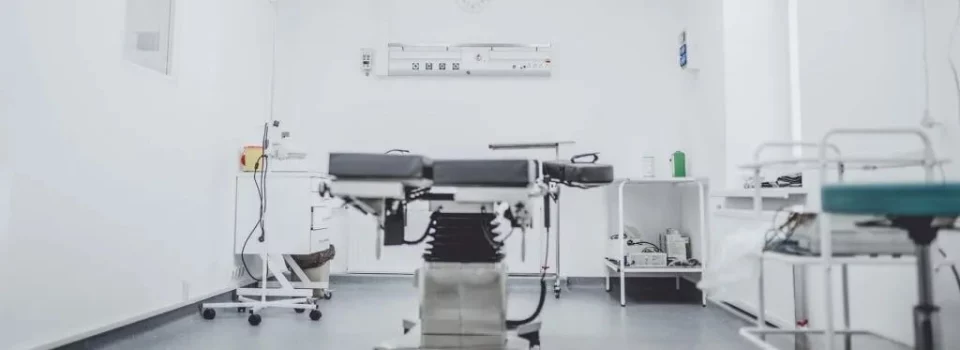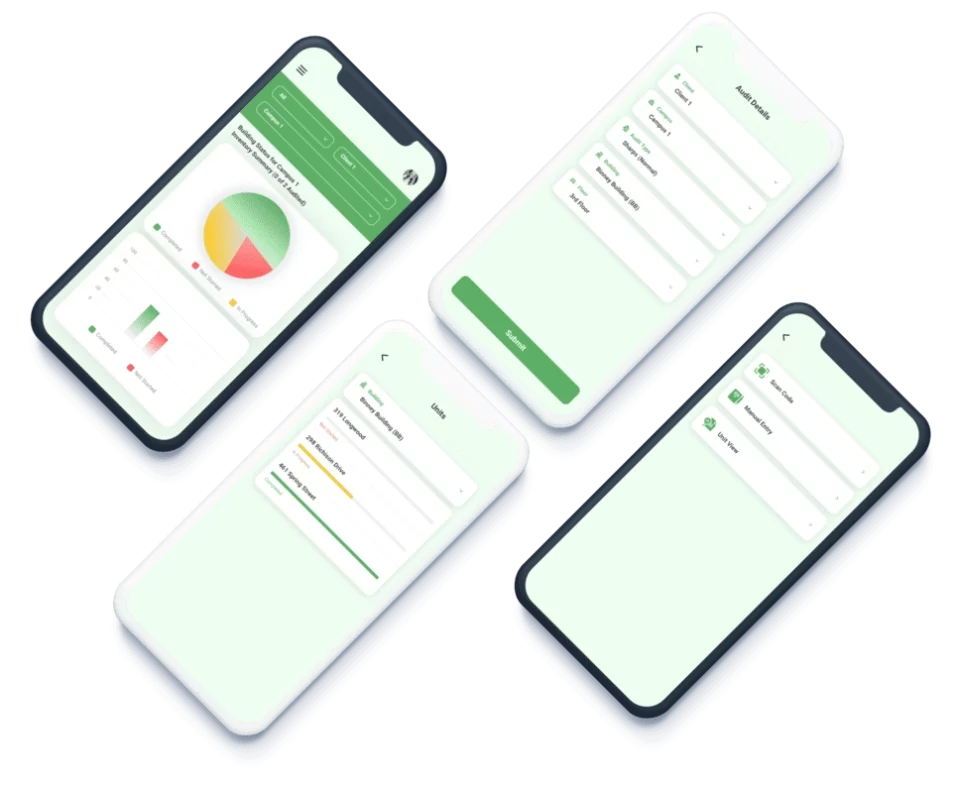BACKGROUND
Our client wanted to improve efficiency of hospital operations from 70% to 100% efficiency
America’s #1 children’s hospital is home to the largest pediatric research facility in the country.
World-renowned as a center for medical expertise, the hospital (name withheld for confidentiality reasons) serves more than 29,000 patients on an annual basis and is nationally ranked in more than 10 pediatric specialties. Equipment order fulfillment and asset inventory management are vital operational processes that ensure supplies, equipment, and resources get where they are needed across the hospital’s 1 million square foot campus—without delaying life-saving medical interventions—or wasting essential organizational resources.
HealthOps is the healthcare operations management vendor responsible for handling the operational logistics, equipment, sharps, and safety standards needed to deliver the best possible outcomes for the hospital's patients. After completing robust equipment audits, the firm realized that error-prone and cumbersome manual processes were reducing operational efficiencies and negatively impacting patient outcomes.
The hospital’s existing equipment order fulfillment and asset inventory management system were spread across a variety of different technology platforms and paperwork-driven manual inventory recording systems. Our client needed to digitize, optimize, streamline, and automate these key operational logistics processes to expedite services, improve efficiency, reduce costs, and enhance accuracy.
After the initial version of the application went live, the client’s vision expanded beyond equipment logistics to include digital transformation of patient transport workflows, preventive maintenance management, and cross-campus service routing. The challenge was not just to digitize isolated workflows, but to create a scalable and modular logistics platform that could adapt to evolving operational needs across departments and campuses. This initiative laid the foundation for centralized control over transport, asset lifecycle tracking, and SLA-based reporting, enabling long-term flexibility.
CHALLENGE
To create a scalable order fulfillment and asset management process
Before contracting Asahi Technologies, the hospital's equipment order fulfillment and asset inventory management process required copious manual paperwork and time-consuming data entry. Manually transferring daily inventory figures into the hospital’s computer systems often resulted in errors and inaccuracies reducing the reliability and validity of data.
Meanwhile, the equipment vendor, HealthOps, was unable to optimize vital operational logistics processes using the existing error-prone legacy system. After completing comprehensive audits, it became clear that inaccuracies were leading to inefficiencies of scale that were costing the hospital time, money, and supplies.
Our client needed to develop a new system that would digitize, automate, and streamline the entire end-to-end equipment order fulfillment and asset inventory management processes.
To optimize key operational logistics processes at the hospital, HealthOps enlisted Asahi Technologies to develop a solution with the following features:
- A single unified equipment order fulfillment and asset inventory management process
The new solution needed to streamline various disparate data resources and manual processes to create a single digital source of truth ensuring accuracy, reliability, and adherence to the hospital’s high quality, safety, and efficiency standards.
- Provide role-based access and control of the system
The system needed to provide segmented and tiered access for 5 unique user persona types: administrators, supervisors, leads, tech, and requestor. - Automate, streamline, and optimize core business processes
The goal of this robust digital transformation initiative was to implement automation to optimize the process and save time, money, and mission-critical organizational resources. - Create a more agile and scalable solution
To fulfill HealthOp’s requirement to develop a modular solution that could be refined and scaled to meet changing needs in the years ahead. - Role-specific patient transport workflows
The system needed to support four distinct patient transport types—Procedure, Return, Transfer, and Discharge—each with configurable steps and dynamic form elements based on the selected transport type. - Patient identity verification
To ensure safe and accurate transport handling, it was necessary to implement QR code scanning and include birthdate fields for validating patient identity. - Administrative control over transport features
Administrators required the ability to enable or disable specific transport types, set timing windows for service delivery, enforce patient bracelet scanning, and manage customizable workflow header messages. - Preventive maintenance and asset tracking
As equipment usage expanded, there was a growing need for preventive maintenance tracking with scan-time enforcement, along with asset depreciation data and usage cycle counters to manage the asset lifecycle effectively. - Inventory level alerts and notifications
The system needed to support alerts for critical inventory levels with visual indicators, and configurable email or SMS notifications to ensure timely responses. - Order subdivision for large deliveries
Dispatchers required functionality to split large orders into multiple sub-orders, enabling more efficient handling and fair workload distribution among technicians. - Campus-specific service routing
To support a growing hospital network, the system had to enable service routing based on campus needs, allowing specific request types like sharps or transport to be selectively activated or hidden for each location.

SOLUTION
Customized mobile app with requestor and administrator portals
To fulfill the client’s development criteria and support critical business process automation, our team developed an integrated equipment order fulfillment and asset inventory management solution that unified the hospital's internal equipment ordering and fulfillment processes.
We implemented a custom software and hardware solution.
Solution highlights:
- AWS EC2 Instance for hosting the backend application
- AWS SES for email management
- MYSQL Database to securely store the organizational data used in the applications
- React Native to build iOS and Android mobile applications
- Watermelon Database to provide local data storage capability in the mobile devices running the application
- Spring Boot and JPA Frameworks to form a strong foundation for the application and to ensure future scalability
- React to power the administrator portal
- js to deliver more comprehensive dashboard functionality
- Bluetooth Barcode Scanner hardware for scanning inventory items
Our custom software deployment involved the creation of two web-based applications (administrator and requestor portal) as well as a mobile app. The solution provides real-time visibility into the status of equipment and asset requests, while automating end-to-end fulfillment, and ensuring that inventory totals are updated in real-time. Instead of requiring clinical care teams to complete additional paperwork and time-consuming data entry, the solution vastly improves the speed, accuracy, and reliability of operational logistics while providing more comprehensive data analysis and reporting capabilities.
The dashboards and mobile applications create a single source of truth that ensures accurate accounting of organizational resources. The completed system does not require manual recording of inventory totals and utilizes automation to streamline and digitize what used to be disparate manual processes executed using various software inputs. The result is a completely modular software and hardware-based solution that simplifies, expedites, and enhances key operational logistics processes at America’s #1 children’s hospital.
The platform was significantly extended with the introduction of a comprehensive Patient Transport Module. This module supports customizable workflows tailored to four distinct transport types—Procedure, Return, Transfer, and Discharge—each designed to accommodate the specific operational requirements of patient movement within the hospital. To ensure the accuracy and security of transport requests, users can validate patient information by scanning QR codes from patient wristbands. Additionally, administrative users can designate specific hospital units as “procedural” using a toggle switch, which determines their eligibility in transport workflows, providing greater flexibility in managing department-level operations.
Enhancements to the Admin Control Panel further empowered operational teams. Administrators now have granular control over transport configurations, including the ability to enable or disable specific transport types, define allowed destinations, and enforce bracelet scanning protocols for added verification. Real-time control over workflow timing and customizable banner messages also ensures the system remains responsive to shifting needs and hospital policies.
On the data and analytics front, Advanced Reporting Features were introduced to improve visibility and oversight. Reports were enhanced to include detailed breakdowns by service level agreement (SLA) and request type.
To improve asset reliability and operational planning, several Asset Lifecycle Enhancements were implemented. A robust Preventive Maintenance (PM) workflow now alerts users when equipment is due for servicing and allows administrators to enforce compliance when necessary. Furthermore, depreciation tracking was added, including key metrics such as manufacturer suggested retail price (MSRP), usage cycles, and repair frequency. These additions help inform strategic decisions related to equipment procurement, retirement, and replacement.
In terms of Order Management, the system now supports the subdivision of large or complex requests. Dispatchers can split these into multiple smaller child orders, preserving the original metadata while enabling more efficient allocation of tasks and fair crediting of multiple technicians.
A critical usability enhancement was the system’s new Campus-Aware Behavior, which allows administrators to assign specific request types (e.g., equipment, transport, sharps) to individual campuses. This reduces clutter in the request interface and ensures services are only available where they are applicable, minimizing user error.
To maintain operational readiness, an intelligent Alert System was integrated. This feature lets admins define threshold rules for inventory levels of key assets. When availability drops below a critical level, the system generates visual alerts in the dashboard and can send automatic notifications via email or SMS to designated users, ensuring timely intervention.
Lastly, improvements were made to Dashboard Analytics through the introduction of a "Sigma" snapshot button. This feature generates a real-time summary of activity from the past 12 hours, filtered based on current dashboard selections such as campus, item type, or request category, allowing administrators to make quick, informed decisions on the fly.

TESTIMONIAL
Exemplary work

Isaiah E. Silva, Massachusetts
Founder & Principal, BCH's Equipment Supply Firm
IMPACT
America’s #1 Children’s Hospital is a trail-blazer in asset inventory management
- The completed integrated equipment order fulfillment and asset inventory management solution allowed the hospital to take a critical step forward toward achieving more robust operational agility through digital transformation. The new system helped to streamline core operational processes, expedite order fulfillment, and inventory management, while providing a user-friendly interface delivering role-based access to empower every stakeholder connected to the end-to-end process.
- This deployment and collaboration with Asahi Technologies’ team was very successful, and the client has requested the software to be further enhanced to deliver more robust functionality to support the management of new requests—to transport patients around the hospital's sprawling campus. The overall development architecture and user interface have proven so successful for its task that additional medical facilities across the United States are currently discussing deploying the system.
- The system has become a hospital-wide operational backbone, supporting not only logistics and inventory but also real-time patient movement and asset safety compliance. The Preventive Maintenance integration has led to improved equipment uptime and usage tracking.
- Campus-specific configuration enables targeted service availability, improving user experience and administrative control. The data-rich dashboards provide real-time insights into inventory, service delivery SLAs, transport requests, and asset status, supporting continuous quality improvement.
- The success of this platform has prompted interest from multiple healthcare facilities nationwide, reinforcing its value as a replicable and scalable logistics solution for hospitals.


 Java
Java  MySQL
MySQL  React Native
React Native  Spring Boot
Spring Boot 



